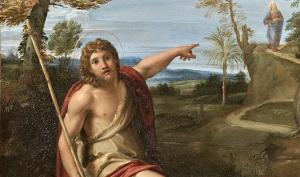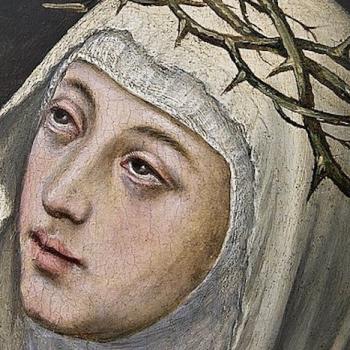
If no one knew that Jesus was the messiah yet, what was John’s baptism about? What was he baptizing people in the name of? It seems this would have been blasphemy in the eyes of the Jews.
Today I take on another question from a reader. This is, in fact, one of the first questions I wrestled with an an undergraduate at Olivet Nazarene University. I’d begun studying the Qumran community of Jewish Essenes that gave us the Dead Sea Scrolls, and for whom ritual water cleansings were important. I’d also looked into the history and theology of Christian baptism. I also puzzled over the question—the same question John himself puzzled over—of why Jesus came seeking a sinner’s baptism.
And I found I was in the end a bit more confused than when I’d begun!
It seems to me that the two key threads that come together in John’s baptism are the water rituals themselves, and the messianic faith of Israel. Let’s take them one at a time.
The Origins of John’s Baptism
Mikveh
The notion of a ritual water cleansing is important in Torah. The Levitical code offers instruction in how the people are to be holy as Yahweh is holy. But doesn’t this command seems ridiculous as soon as we read it? God is life. Even before we get to the matter of human sinfulness, Israel can’t be holy like God because they die. Life fluids—blood, semen—pour out of their bodies.
But Leviticus doesn’t ask the people to stop being humans who die, who bleed, or who have sex. Instead, it offers rituals of cleansing. This is how humans who are constantly losing their life fluids can be like the God who is life itself.
Have you touched a dead body? Contracted a deadly disease? Lost blood? Had sex? Go to a reservoir of water, or miqweh, 11:36 says, and wash in it. This is the mikveh, or ritual bath. This will be the bodily habit that will train your heart toward God’s life that never runs out. A bodily cleansing as a prayer to share in God’s holiness.
There’s a fascinating appropriateness to the rite that we could talk more about. Water is life. God makes all things from formless sea. So a dip in a pool becomes for Israel a way of returning to God’s life, creation, God’s holiness, and of trusting that God desires us to live.
Qumran Baptism
The Essenes of the Qumran Community, active at the time of Jesus’ birth, took this teaching of the mikveh and offered it in a new way. They taught water purification as an act of internal devotional cleansing. The mikveh was always a public rite of cleansing; now it was also a personal rite of preparation for prayer and dedication to God.
John’s character and message resonates in significant ways with the Essenes, though there are also differences. It seems to me most likely that he learned from them, maybe was one of them for a time, but then gave their teaching a new twist. In effect, he combined the Levitical code with the Qumran one. Water of baptism is a public rite that signals our turning from death toward holiness. It is also a rite of personal preparation, involving repentance of sins.
But preparation for what? This leads us to the second element of John’s baptism. It doesn’t simply witness to live-giving repentance and prepare the people for devotion to God. Beyond this, it prepared them for the coming messiah.
Baptism and Messianic faith
Who is the Messiah?
The mashiach, or messiah of Israel, is a figure whom the prophets are the first to begin describing. The term means “anointed one,” and draws on the imagery of the anointing of kings, as in 1 Samual 16. Sometimes the prophets seem to imply that the royal anointing will be literal (Jeremiah 23:5). Other times it seems more like an analogy (Isaiah 11): as David was anointed king, so one day Israel will have a royal leader sent by God.
Connected to the question of literal vs analogical king is the question of political or analogical liberation. Will the mashiach end the lordship of Assyria? Of Babylon? Greece? Rome? Or will his reign be less visible to kings and armies? Again, the record is mixed.
What seems clear at least is that with the coming of God’s anointed one, righteousness and peace will reign in God’s land, among God’s people, and even among the nations. The lost tribes will finally walk out of exile. Injustice will come to an end. The messiah will begin the apocalyptic age, in which the veil of sorrow and injustice will roll back, and the deep goodness of God’s creation will finally become the law of the land.
John’s Messianic Faith
John, it seems, believed that this day had come. It’s not entirely clear what the people thought “at hand” meant when they came to him at the Jordan. Did they imagine he meant “next week the messiah will walk up to this river?” Or rather, like in their readings of Jeremiah and Isaiah, did they assume he meant “God’s anointed one is coming one day, so let’s make ready?”
The latter would not have been blasphemy. It placed John right in the tradition of the prophets, who let the people of Israel know over and over that the age of sorrow would come to an end.
The former would not have been blasphemy either, I don’t think, since there was a real hope in an actual messiah of some sort. Surely one day he would walk through the streets or wilderness. But such a claim clearly would have been deeply controversial. When, in John 1:29, John says “here he is,” it surely came as a surprise.
(Yet another complexity of John’s proclamation is the way that he combines the messianic figure with the suffering servant of Isaiah, and so also the Passover lamb from Exodus. Traditionally, the anointed one is a kingly figure, not a wounded savior or a lamb that takes away sin. I told you John’s baptism is complicated!)
So what was John’s baptism about?
Gathering all this up, we can say this. John’s baptism was an adaptation of
- Levitical rites of public purification
- Contemporary Essene rites of personal preparation
- A proclamation of faith in a coming messiah
- An appeal for God’s saving work, rendered habitual through repentance and discipleship
And, of course, for the Gospels, this is all prelude to the ministry of Jesus. That means, I think—though it would be a longer study—that all this gets incorporated into Christian baptism. Jesus performs his own adaptiation of John’s water ritual. His disciples do as well. Paul eventually connects it with Jesus’ death and resurrection. But the point, at least for now, is that this Jewish faith—Yahweh’s holy life, Israel’s messiah, the Passover and suffering servant—lives inside the baptism that founds Christianity.
Theology is full of challenging questions, and the “answers” are generally more about sorting through the elements in a persuasive manner than about “solving for X.” It’s a honor to receive your questions. Keep them coming!










